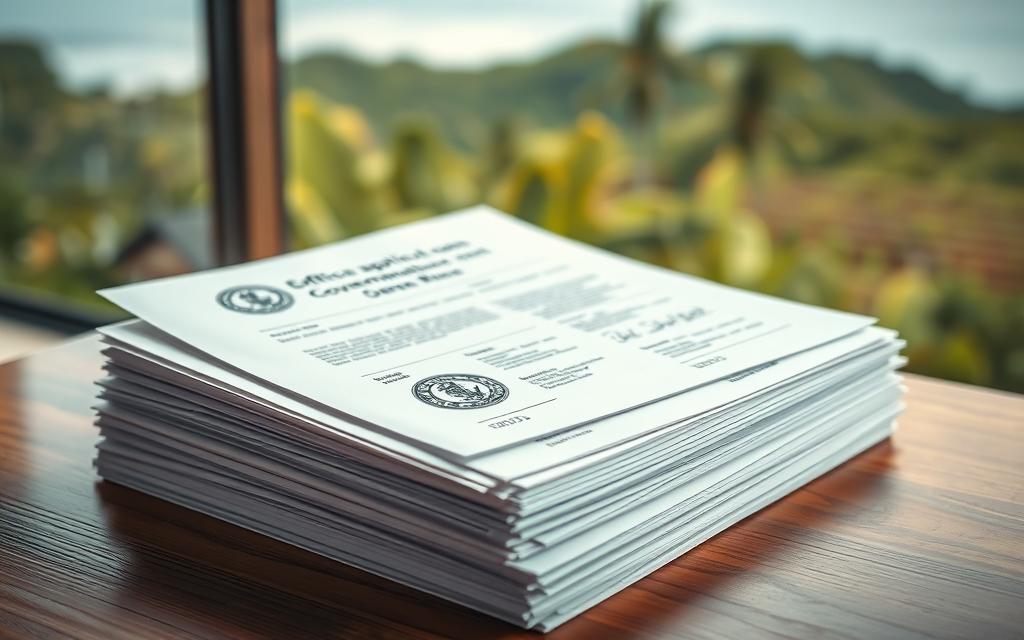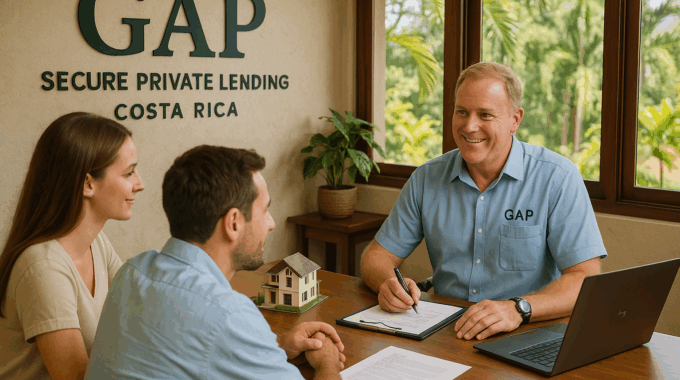Unlock financial opportunities with Responsive Gap Equity Gap Loans. Our flexible solutions bridge funding gaps, empowering you to seize real estate investments and renovations.

Streamline Your Loan Application Process in Costa Rica
Investing in Costa Rica’s thriving real estate market can be a lucrative opportunity, with foreign investment increasing by over 20% in the past year alone. As a result, properties in regions like Guanacaste and San José have appreciated by 8-15% annually.
We connect borrowers with private lenders, offering competitive rates and flexible financing options for property investments. By using your home as collateral, you can access significant funds with easier qualification. Our goal is to simplify the financing process, helping you achieve your investment goals without unnecessary hurdles.
With GAP Equity Loans, you can benefit from streamlined qualification processes and competitive rates compared to traditional banking options. We’ll guide you through the unique financial landscape of Costa Rica, helping you make informed decisions about your property investment.
Understanding the Costa Rican Financial Landscape
Navigating the financial landscape in Costa Rica requires a deep understanding of its unique banking system. Costa Rica’s financial sector is characterized by a mix of government-owned banks, such as Banco Nacional and Banco de Costa Rica, and private lending institutions, each offering distinct advantages and limitations.
Traditional Banks vs. Private Lenders
Traditional banks in Costa Rica typically offer lower interest rates, ranging from 7-9.5%, but have stricter qualification requirements and longer processing times. In contrast, private lenders provide more flexible financing options with faster approval processes, though they generally charge higher interest rates, typically between 12-16%, to offset the increased risk. We recommend exploring both options to determine which best suits your financial needs.
The Unique Challenges of Financing in Costa Rica
Foreign investors and non-residents often face additional challenges when seeking loans through traditional Costa Rican banks, including higher down payment requirements and extensive documentation needs. To overcome these challenges, it’s essential to understand the unique aspects of Costa Rica’s financial landscape. You can contact us to see if you qualify for a loan.
Understanding these differences is crucial for determining the most suitable financing route for your specific situation and investment goals in Costa Rica. The private lending network has grown significantly, with over 700 investors from North America and Europe actively participating in the private lending market.
Benefits of Equity Loans in Costa Rica
Unlocking the value of your property in Costa Rica has never been easier with equity loans. These financial tools allow homeowners to tap into the equity they’ve built in their real estate, providing access to significant funds.
Using Your Property as Collateral
Equity loans in Costa Rica allow property owners to leverage their real estate as collateral. The loan amount is determined by your property’s value and the Loan-to-Value (LTV) ratio, which typically ranges from 50-80% in Costa Rica. This means you could borrow up to 80% of your property’s assessed value, providing substantial financial flexibility.
Advantages Over Traditional Financing
Unlike traditional financing options that heavily focus on credit history and income verification, equity loans prioritize the property’s value. This makes them accessible to borrowers with limited Costa Rican credit history or irregular income. Additionally, equity loans offer faster processing times and flexibility in how funds can be used, whether for property improvements, business investments, or debt consolidation.
For foreign investors and property owners in Costa Rica, equity loans represent a practical financing solution that bypasses many challenges associated with traditional bank financing in a foreign country. The interest paid on these loans may also offer tax advantages, providing additional financial benefits.
Essential Documentation for Loan Applications in Costa Rica
Costa Rica’s lenders require specific documentation to verify identity, financial stability, and residency status during the loan application process. Having all the necessary paperwork ready can significantly speed up the approval process and improve the chances of a successful loan application.
Personal Identification Requirements
Personal identification is the first step in any loan application. Borrowers must provide a valid passport or residency card. Utility bills may also be required to verify the applicant’s address and identity.

Financial Documentation Needed
Financial proof is equally crucial in the loan application process. Lenders typically ask for bank reference letters, tax returns, and 12 months of bank statements. These documents demonstrate the applicant’s income, expenses, and ability to repay the loan. For corporate borrowers, additional documents such as financial statements and cash flow projections may be required.
Property-Related Documents
For equity loans, property-related documents are essential. These include the property title (escritura), property survey (plano catastrado), property tax receipts, and a recent professional appraisal. Ensuring that these documents are in order can facilitate a smoother loan application process.
By preparing all the required documentation in advance, applicants can streamline their loan application process in Costa Rica, whether they are applying through a traditional bank or a private lender.
The Loan Application Process in Costa Rica: Step by Step

Navigating the loan application process in Costa Rica can be complex, but understanding the steps involved can simplify the experience. We aim to guide you through this process, ensuring that you can secure the financing needed for your investment property goals without unnecessary hurdles.
Initial Consultation and Pre-Qualification
The loan application process begins with an initial consultation where lenders assess your financial situation, loan needs, and preliminary eligibility based on your income and the property you’re using as collateral. During pre-qualification, lenders review your basic financial information and property details to provide an estimate of how much you might qualify for.
Property Valuation and Assessment
The property valuation stage is critical for equity loans, as a professional appraiser determines the current market value of your property, directly impacting the loan amount you can receive. This step is essential in determining the property value and ensuring that it aligns with the loan requirements.
Final Approval and Disbursement
The final approval stage involves a comprehensive review of all documentation, verification of property title, and final underwriting before the loan is officially approved. Once approved, loan disbursement typically occurs through a formal closing process where all legal documents are signed, and funds are transferred to your account or directly to the intended recipient.
Working with experienced loan facilitators who understand Costa Rica’s unique financial landscape can significantly streamline this process. Traditional banks in Costa Rica may take 30-90 days to complete the application process, while private lenders can often complete it in 7-14 days, making them preferable for time-sensitive financing needs.
Understanding Loan Terms and Interest Rates
When considering a loan in Costa Rica, understanding the terms and interest rates is crucial for making an informed decision. The financial landscape offers various loan options, each with its own set of conditions.
Typical Interest Rates for Costa Rican Loans
Interest rates in Costa Rica vary between traditional banks and private lenders. Bank rates typically range from 7-9.5%, while private lenders start around 12% and can go up to 16% depending on risk factors, including the Loan-to-Value (LTV) ratio.
- Interest rates are influenced by the borrower’s financial profile and the loan term.
- The LTV ratio significantly affects interest rates; higher LTV ratios result in higher rates.
Loan Duration and Repayment Options
Loan duration for equity loans through private lenders typically ranges from 6 months to 3 years, significantly shorter than traditional bank mortgages. Repayment options vary, with some lenders offering interest-only payments and others requiring regular principal and interest payments.
- Private lenders often offer more flexible repayment terms than banks.
- Borrowers should consider loan origination fees, closing costs, and potential prepayment penalties.
GAP Equity Loans: A Flexible Financing Solution
GAP Equity Loans is revolutionizing financing in Costa Rica with its flexible loan solutions. We offer a unique financing opportunity for property owners, allowing them to leverage their property’s value to access capital.
Loan Amounts from $50,000 to $1,000,000
GAP Equity Loans provides financing solutions ranging from $50,000 to $1,000,000, based on the property’s value and equity position. This range allows property owners to access significant capital for various financial needs.
Competitive Interest Rates and Flexible Terms
Our interest rates start at 12% and are determined by factors such as the Loan-to-Value (LTV) ratio, property location, and overall risk assessment. We offer flexible loan terms between 6 months and 3 years, catering to different financial requirements.
The Private Investor Network Advantage
The private investor network behind GAP Equity Loans includes over 700 investors from North America and Europe, specifically interested in the Costa Rican market. This network enables faster decision-making, with most loans approved within 7-10 business days. To explore how GAP Equity Loans can help you, visit our website at GAP Equity Loans Costa Rica.
By focusing on property valuation and clear title verification, we streamline the application process, reducing paperwork and processing time. GAP Equity Loans can be used for various purposes, including property improvements, business investments, debt consolidation, or purchasing additional investment properties in Costa Rica.
Special Considerations for Foreign Investors and Non-Residents

Costa Rica presents an attractive investment opportunity, but foreign investors and non-residents often encounter difficulties in obtaining financing. Residency status plays a crucial role in determining the availability of loan options.
Residency Status and Its Impact on Borrowing
Residency status is a critical factor in securing a loan in Costa Rica. Permanent residents typically have access to better loan terms and lower interest rates. In contrast, temporary residents and non-residents may face stricter requirements, such as higher down payments or additional documentation, including proof of income, tax returns, and a detailed credit history. Some lenders may also require a local co-signer or collateral.
Alternative Financing Options for Non-Residents
For non-residents, alternative financing options are available, including seller financing, private equity loans, and international lenders specializing in cross-border financing. We offer hard money loans for foreigners in Costa, providing a viable solution for foreign investors. Self-directed IRAs can also be used as a creative funding method for Costa Rican property purchases.
It’s essential for foreign investors to be aware of currency exchange risks when taking loans in Costa Rican colones while earning income in dollars or other foreign currencies. Working with a bilingual attorney specializing in real estate transactions can help navigate the legal complexities of borrowing in Costa Rica.
Comparing Bank Loans vs. Private Lending in Costa Rica
When considering financing options in Costa Rica, understanding the differences between bank loans and private lending is crucial. Both options have their advantages and cater to different needs and financial situations.
Processing Times and Approval Rates
One of the most significant differences between bank loans and private lending in Costa Rica lies in their processing times and approval rates. Banks often take 2-4 months to approve a loan, while private lenders can complete the process in 7-14 days. For foreign investors and non-residents, private lenders offer substantially higher approval rates, approving approximately 70-80% of qualified applications compared to banks’ 30-40% approval rate.

Fee Structures and Hidden Costs
The fee structures for bank loans and private lending in Costa Rica also differ significantly. While traditional banks may charge lower interest rates (7-9.5%), they often include numerous hidden costs such as application fees, administrative charges, and mandatory insurance products. Private lenders, on the other hand, typically charge a straightforward loan origination fee of 2-5% of the loan amount, with transparent closing costs and fewer hidden fees. Borrowers should also budget for appraisal fees, title searches, and mortgage registration costs, which are around 1.64% of the loan amount.
Tips for Streamlining Your Loan Application Process
Efficiently managing your loan application can make a significant difference in Costa Rica’s competitive financial landscape. We aim to simplify this process, helping hardworking individuals secure the financing needed to achieve their investment property goals without unnecessary hurdles.
Preparing Your Documentation in Advance
To streamline your loan application process, thorough preparation is essential. Gathering all required documentation before initiating your application is crucial. This includes personal identification, financial records, and property information. Organizing your documentation into categories (personal, financial, property-related) and creating both digital and physical copies facilitates quick responses to lender requests. Consider getting pre-qualified before beginning your formal application to assess your borrowing capacity and identify potential issues early.

Working with Experienced Loan Facilitators
Working with experienced loan facilitators who specialize in Costa Rican financing can dramatically improve your experience. They understand local requirements and can advocate on your behalf. Bilingual facilitators are particularly valuable for foreign borrowers, as they bridge communication gaps and ensure all documentation is properly translated and authenticated. Be transparent about your financial situation and property details from the start to avoid delays and rejections. Respond promptly to requests for additional information to keep the process moving.
Conclusion: Securing Your Financial Future in Costa Rica
With the right guidance, borrowers can access competitive financing for their property investments in Costa Rica. Navigating the loan application process requires understanding the unique aspects of the country’s financial landscape and choosing the financing option that best aligns with your specific needs and circumstances.
For many foreign investors and property owners, equity loans represent an ideal solution, balancing accessibility, speed, and reasonable terms. We connect borrowers with private investors and lenders, providing competitive rates and flexible financing options. To learn more about our services and how we can assist you, visit our page on topics of interest.
By being well-prepared with proper documentation and realistic expectations, you can secure the financing needed to achieve your property investment goals in Costa Rica. The right financing solution should align with your long-term financial strategy, whether you’re investing for rental income, property appreciation, or creating your dream home.
Article by Glenn Tellier (Founder of CRIE and Grupo Gap)



